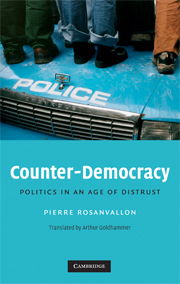Book contents
- Frontmatter
- Contents
- Foreword
- Introduction
- Part 1 Overseeing democracy
- 1 Vigilance, denunciation, evaluation
- 2 The overseers
- 3 The thread of history
- 4 Legitimacy conflicts
- Part 2 The sovereignty of prevention
- Part 3 The people as judge
- Part 4 Unpolitical democracy
- 14 Conclusion: the modern mixed regime
- Index
- References
2 - The overseers
Published online by Cambridge University Press: 24 May 2010
- Frontmatter
- Contents
- Foreword
- Introduction
- Part 1 Overseeing democracy
- 1 Vigilance, denunciation, evaluation
- 2 The overseers
- 3 The thread of history
- 4 Legitimacy conflicts
- Part 2 The sovereignty of prevention
- Part 3 The people as judge
- Part 4 Unpolitical democracy
- 14 Conclusion: the modern mixed regime
- Index
- References
Summary
The three forms of oversight that I discussed in the previous chapter rely on agents of various types. Surveillance first developed in a context of intense civic mobilization (the French Revolution) and involved social activity of many kinds. The oversight role subsequently shifted to the media (in the broadest sense of the term). In the nineteenth century, the press embodied liberty in action and exercised counter-democratic power. The Pen and the Podium were complementary (if often antagonistic) components of a single system. Both shared the same ambition: to represent the people. Over the course of the twentieth century, the conflict between the press and the politicians ranged over a broader and broader territory. Other agents and agencies began to perform similar functions of oversight, disclosure, and evaluation. From 1980 on, these newcomers began to play an ever-expanding role. New citizens' organizations emerged, independent supervisory authorities were constituted, and new methods of evaluation were introduced. A new form of power began to take shape: the social watchdog. But this power continued to reflect a personal ethical choice, a disposition of the individual. The early twentieth-century French philosopher Alain (Émile Chartier) is a good example of the type.
The vigilant citizen
Alain exemplifies what was most generous and authentic in the nineteenth-century republican spirit. For him, the Republic was not merely a regime; it was a way of structuring and legitimating power and embodied a public morality, a code of civic behavior.
- Type
- Chapter
- Information
- Counter-DemocracyPolitics in an Age of Distrust, pp. 57 - 75Publisher: Cambridge University PressPrint publication year: 2008

